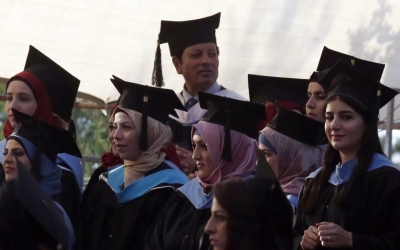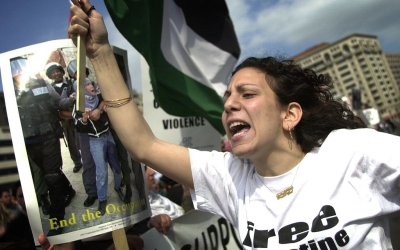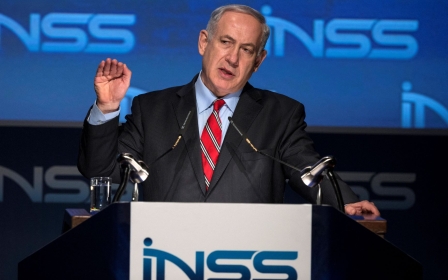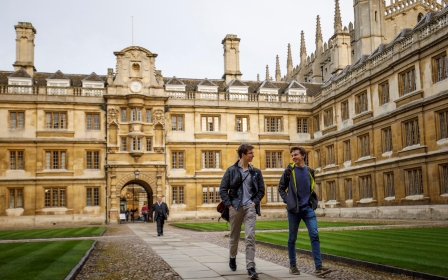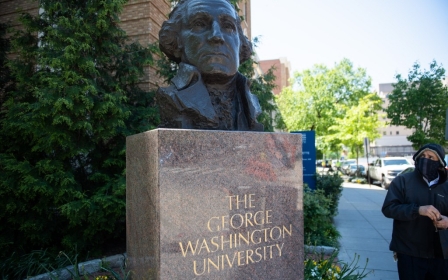NYU urged to shut down Tel Aviv campus after Amnesty report on Israel
When Mariam S was a first-year student at New York University (NYU), her friends, family and faculty encouraged her to study at one of the 15 campuses the famed institution has scattered across the globe.
With countless countries to choose from, Mariam, who is of Palestinian descent, had her heart set on NYU's Tel Aviv campus.
Born in New York, she had never visited her parents' homeland and thought the study abroad scheme presented her with an opportunity to visit the country of her forefathers and continue studying at a world-class institution.
"My dad was the one who actually told me to apply to the Tel Aviv study abroad programme," Mariam told Middle East Eye.
"I know it seems silly that me, a Palestinian, would want to go to Israel. But, [I thought] how else can I get there?"
With Israeli authorities repeatedly rejecting the family's visitor visas, Mariam's father thought that since she was an NYU student applying to one of the university's own programmes, they would surely let her in; that she'd be able to visit her relatives and maybe walk through the country's famed fields of olive trees.
But shortly after submitting her application, Mariam's visa was rejected once again. And she isn't alone. Many students - and even departments at NYU - have documented similar experiences.
In 2019, NYU's Department of Social and Cultural Analysis (SCA) announced that it was pledging non-cooperation with NYU-Tel Aviv, citing entry restrictions for Palestinians and "members of groups that are critical of government policies".
Last year, nearly 600 faculty, staff, students and alumni signed a statement pledging non-cooperation with the Tel Aviv programme "until the Israeli state ceases its military campaign and takes action to end discriminatory policies that limit Palestinian students' access to education".
'Israel singles itself out'
Every year, thousands of people of Palestinian origin or other nationalities are denied entry to Palestine by Israeli border authorities, usually at Ben Gurion Airport or land borders such as the Allenby Bridge between Jordan and the West Bank.
A 2017 amendment to Israel's entry law has barred access to foreigners who are identified as key proponents of the Boycott, Divestment, Sanctions (BDS) campaign, which potentially includes students at NYU.
Just a few weeks after a landmark report by Amnesty International labelled Israel an apartheid state, pressure is mounting on businesses, athletes and US universities to boycott Israel over its treatment of Palestinians. That pressure has intensified at NYU, with students and activists demanding the university suspend its Tel Aviv programme, citing the Amnesty report.
"NYU cannot, in good conscience, operate an academic centre in an apartheid state while claiming in its non-discrimination and anti-harassment policy to be committed to creating an environment free of harassment and discrimination based on race, colour, creed, religion, national origin, ethnicity or citizenship status," wrote Trace Miller, managing editor of the Washington Square News, NYU's independent student newspaper.
'I don't believe our university should be running an operation that violates its own policies against racial and religious profiling'
- Andrew Ross, NYU
An NYU spokesperson responded to the letter, saying that the university has made an affirmative decision to embrace global engagement.
"Closing NYU Tel Aviv would run counter to that intrinsic aspect of the university's character," they said.
"NYU believes that academic boycotts - and let's not quibble, the closing of our Tel Aviv programme would amount to nothing less - violate the principles of academic freedom and the free exchange of ideas to which NYU is committed.
"The singling out of Israel as a location from which NYU should decamp - and the proposition that Israeli universities should be boycotted - not only reduces the region's extraordinarily complex history and politics to a simplistic rendering, it is at odds with at least the spirit of that policy."
Andrew Ross, the director of American Studies at NYU, said there was a growing culture at universities - and elsewhere - where voices were being drowned out if they highlighted Israel's treatment of Palestinians.
"When people say, as they did after our department passed its resolution, ‘Why are you singling out Israel?’ The answer is 'Israel singles itself out'," Ross told MEE.
"I don't believe our university should be running an operation that violates its own policies against racial and religious profiling."
'Atrocious human rights records'
Palestinian activist Nerdeen Kiswani, who is the founder of Within Our Lifetime (WOL), told MEE that shutting down the Tel Aviv campus was long overdue.
"Palestinians have been demanding an end to academic collaborations with Israel for decades. This partnership whitewashed and normalises Israel's ongoing colonisation of Palestine, the occupation, and the apartheid system," she said.
"Meanwhile, Palestine students are subjected to checkpoints, raids on their universities, and imprisonment. All academic institutions are called to boycott Israel for its gross human rights violations against the Palestinian people."
According to the Jerusalem Post, students and faculty staff had expressed concerns about NYU-Tel Aviv as early as 2007 - before the campus was officially opened. Since then, criticism has also been directed at the university's other campuses, including the $1bn Abu Dhabi campus.
Students staged sit-ins at the main New York campus to protest at the mistreatment of migrant workers employed in construction works at the site. And in 2017, after the gulf country reportedly denied two NYU professors visas because of their "Shia origins", the journalism department at NYU voted to end its relationship with the Abu Dhabi campus.
"The Abu Dhabi programme was initiated without any consultation with faculty. So, the Shanghai, Abu Dhabi and Tel Aviv campuses are all hosted in very authoritarian countries with pretty atrocious records of human rights abuses," Ross said. "The Tel Aviv programme belongs in that group."
Hassaan Qazi, a student, said he was not surprised that the university was unwilling to change tack and suspend either of the controversial study abroad programmes.
“Tel Aviv exists in spite of a number of voices on campus demanding it is shut down on BDS grounds, and NYU was pretty much okay using de facto slave labour in the construction of its Abu Dhabi campus," he told MEE.
"NYU has no moral backbone, both at home - it's done zilch to curb gentrification through its ever-expanding footprint - and abroad, with campuses like Tel Aviv. Tel Aviv [campus] is a symptom of a larger problem."
Rida Ali, an Arabic language student, said students who are part of the global studies programme are usually required to spend one year abroad during their junior year of college, and her options were Abu Dhabi or Tel Aviv. She chose neither and petitioned to stay in New York.
"The Abu Dhabi campus is literally built on south Asian slave labour. The Tel Aviv campus is literally built on a state that is oppressing a whole population of people and enforcing apartheid," she told MEE.
"I think NYU as an institution does a really good job of pushing students to think about social causes and global issues, but then when we do that and actually start to think about the university’s role in it, then they’re like 'Okay, stop there, that is enough'. I don't think Palestine is a valid issue on this campus for the administration," she added.
Middle East Eye reached out to NYU for comment, but received no response by time of publication.
Middle East Eye delivers independent and unrivalled coverage and analysis of the Middle East, North Africa and beyond. To learn more about republishing this content and the associated fees, please fill out this form. More about MEE can be found here.


